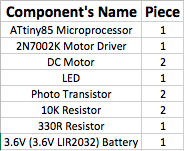[ Science Tutorial #1 ] - The World's Smallest Line Follower Robot!
If you are interested in robotics, you certainly hear the robots following the line. As you can do your own design, you can find dozens of projects on the internet. Unfortunately, this robot does not guarantee to be the first in the competition, but it is a great choice for entertainment.
This robot can be the smallest line follower you can see. It's quite easy to do, but you have to be careful. This robot follows the black line on the white background.
The cost is about 10 US$
Components:

Circuit Diagram:

The circuit diagram is quite simple. The area with the red LED is the transmitter sensor. The green framed area is the receiving part. In the purple frame we have our motor drivers and motors.
At the same time, you need to connect the part that writes V +, the positive pole of the battery and the part that writes the ground to the negative pole of the battery. If you want, you can add a small switch to the circuit.
Here is the completed state of the robot:


Finally, the robot codes: Sensor stuff: one white : ideal situation, move straight both black : no prior : random walk #include "Arduino.h" // the pin definitions // numbers for random walk and memory uint8_t lspd, rspd; // functions // just for convenience and simplicity (HIGH is off) void setup(){ lspd = 17; // give a 6 second pause to set the thing on a white surface void loop(){ void followEdge(){ unsigned long prior = 0; // after edge encounter set to millis + memtime while(true){ if(randomBits == 0){ randomBits = micros(); } if((lsenseval > lwhiteval3) && (rsenseval > rwhiteval3)){ }else if((lsenseval > lwhiteval3) || (rsenseval > rwhiteval3)){ }else{ void moveTime(uint8_t lspeed, uint8_t rspeed, uint16_t time){ void move(uint8_t lspeed, uint8_t rspeed){ void stop(){ // stores the average of 16 readings as a white value void flashLED(uint8_t flashes){
/*
Robot version 2
Simpler. ATtiny85, 2 motors, LED, two sensors
both white : no prior : random walk
: prior : turn in direction of last black
: prior : turn in direction of last white
Sorry if that was hard to understand
*/
#define lmotorpin 1 // PB1 pin 6
#define rmotorpin 0 // PB0 pin 5
#define lsensepin 3 //ADC3 pin 2
#define rsensepin 1 //ADC1 pin 7
#define ledpin 4 //PB4 pin 3
#define steplength 300
#define smallturn 200
#define bigturn 500
#define memtime 1000
uint16_t lsenseval, rsenseval, lwhiteval, rwhiteval;
void testSensors();
void followEdge();
void moveTime(uint8_t lspeed, uint8_t rspeed, uint16_t time);
void move(uint8_t lspeed, uint8_t rspeed);
void stop();
void senseInit();
void flashLED(uint8_t flashes);
#define ledoff PORTB |= 0b00010000
#define ledon PORTB &= 0b11101111
pinMode(lmotorpin, OUTPUT);
pinMode(rmotorpin, OUTPUT);
pinMode(2, INPUT);
pinMode(3, INPUT);
ledoff;
pinMode(ledpin, OUTPUT);
analogWrite(lmotorpin, 0);
analogWrite(rmotorpin, 0);
rspd = 17;
lsenseval = 6;
while(lsenseval){
lsenseval--;
flashLED(1);
delay(989);
}
flashLED(4);
delay(500);
senseInit();
}
followEdge();
}
// now look for edge
uint8_t lastMove = 1; //0=straight, 1=left, 2=right
unsigned long moveEndTime = 0; // the millis at which to stop
unsigned long randomBits = micros();
uint8_t priorDir = 0; //0=left, 1=right, 2=both
uint8_t lastSense = 1; //0=edge, 1=both white, 2=both black
uint8_t i = 0; // iterator
// only update about once every 20ms
delay(18);
// read the value 4 times and average
ledon;
delay(2);
lsenseval = 0;
rsenseval = 0;
for(i=0; i<4; i++){
lsenseval += analogRead(lsensepin);
rsenseval += analogRead(rsensepin);
}
// don't divide by 4 because it is used below
ledoff;
// both white - if prior turn to black, else random walk
if(lastSense == 2 || millis() < prior){
// turn toward last black or left
if(priorDir == 0){
moveEndTime = millis()+smallturn;
move(0, rspd); // turn left
lastMove = 1;
}else if(priorDir == 1){
moveEndTime = millis()+smallturn;
move(lspd, 0); // turn right
lastMove = 2;
}else{
moveEndTime = millis()+bigturn;
move(0, rspd); // turn left a lot
lastMove = 1;
}
}else{
// random walk
if(millis() < moveEndTime){
// just continue moving
}else{
if(lastMove){
moveEndTime = millis()+steplength;
move(lspd, rspd); // go straight
lastMove = 0;
}else{
if(randomBits & 1){
moveEndTime = millis()+smallturn;
move(0, rspd); // turn left
lastMove = 1;
}else{
moveEndTime = millis()+smallturn;
move(lspd, 0); // turn right
lastMove = 2;
}
randomBits >>= 1;
}
}
}
lastSense = 1;
// one white - this is the edge
// just go straight
moveEndTime = millis()+steplength;
move(lspd, rspd); // go straight
lastMove = 0;
lastSense = 0;
prior = millis()+memtime;
if(lsenseval > lwhiteval*3){
// the right one is black
priorDir = 1;
}else{
// the left one is black
priorDir = 0;
}
// both black - if prior turn to white, else random walk
if(lastSense == 1 || millis() < prior){
// turn toward last white or left
if(priorDir == 0){
moveEndTime = millis()+smallturn;
move(lspd, 0); // turn right
lastMove = 2;
}else if(priorDir == 1){
moveEndTime = millis()+smallturn;
move(0, rspd); // turn left
lastMove = 1;
}else{
moveEndTime = millis()+bigturn;
move(lspd, 0); // turn right a lot
lastMove = 2;
}
}else{
// random walk
if(millis() < moveEndTime){
// just continue moving
}else{
if(lastMove){
moveEndTime = millis()+steplength;
move(lspd, rspd); // go straight
lastMove = 0;
}else{
if(randomBits & 1){
moveEndTime = millis()+smallturn;
move(0, rspd); // turn left
lastMove = 1;
}else{
moveEndTime = millis()+smallturn;
move(lspd, 0); // turn right
lastMove = 2;
}
randomBits >>= 1;
}
}
}
lastSense = 2;
}
}
}
analogWrite(lmotorpin, lspeed);
analogWrite(rmotorpin, rspeed);
delay(time);
analogWrite(lmotorpin, 0);
analogWrite(rmotorpin, 0);
}
analogWrite(lmotorpin, lspeed);
analogWrite(rmotorpin, rspeed);
}
analogWrite(lmotorpin, 0);
analogWrite(rmotorpin, 0);
}
void senseInit(){
lwhiteval = 0;
rwhiteval = 0;
ledon;
delay(2);
for(uint8_t i=0; i<16; i++){
lwhiteval += analogRead(lsensepin);
delay(1);
rwhiteval += analogRead(rsensepin);
delay(9);
}
lwhiteval >>= 4;
rwhiteval >>= 4;
ledoff;
}
while(flashes){
flashes--;
ledon;
delay(200);
ledoff;
if(flashes){ delay(500); }
}
}

Very nice that educational people like you are among us
Thanks :) @tulpar